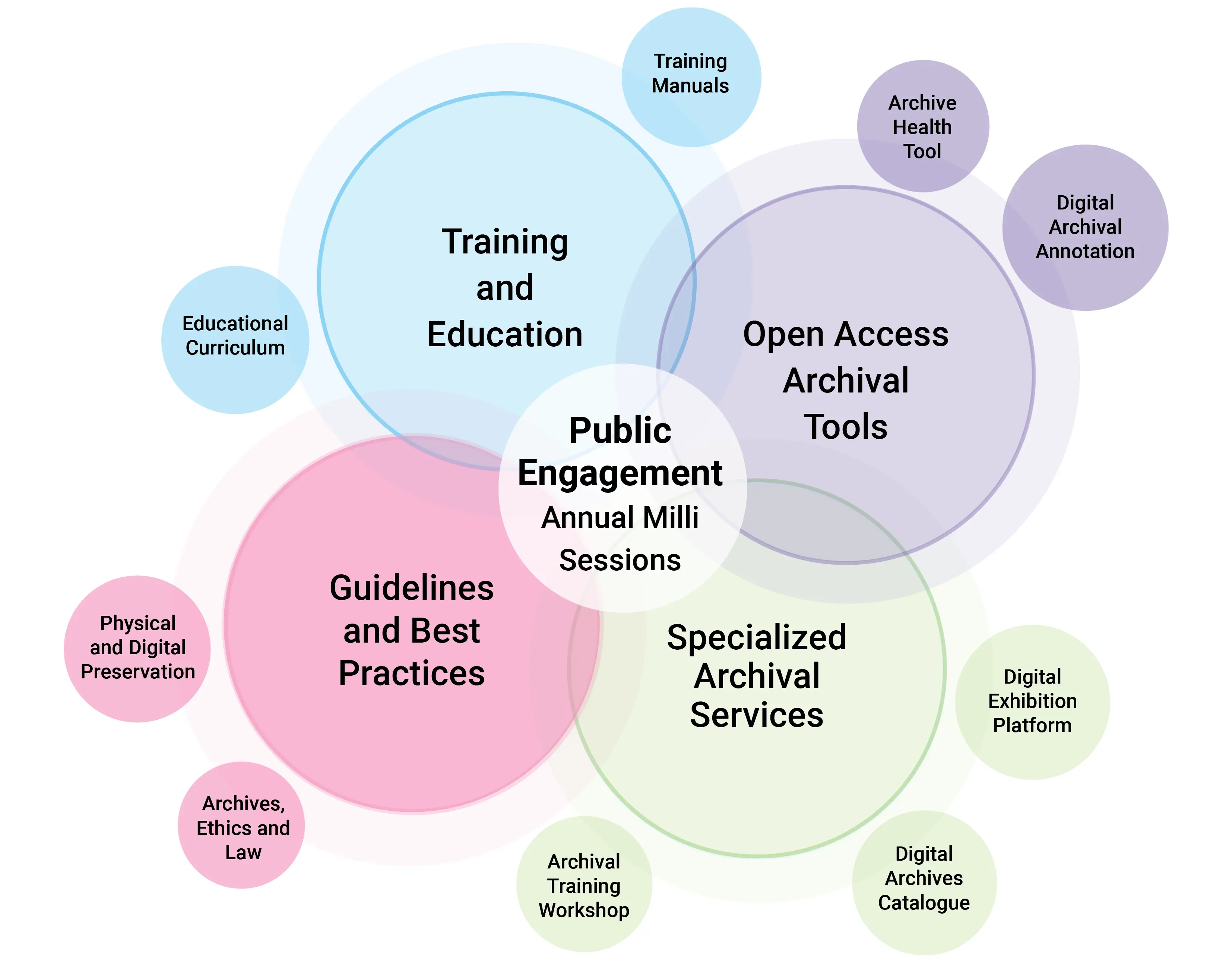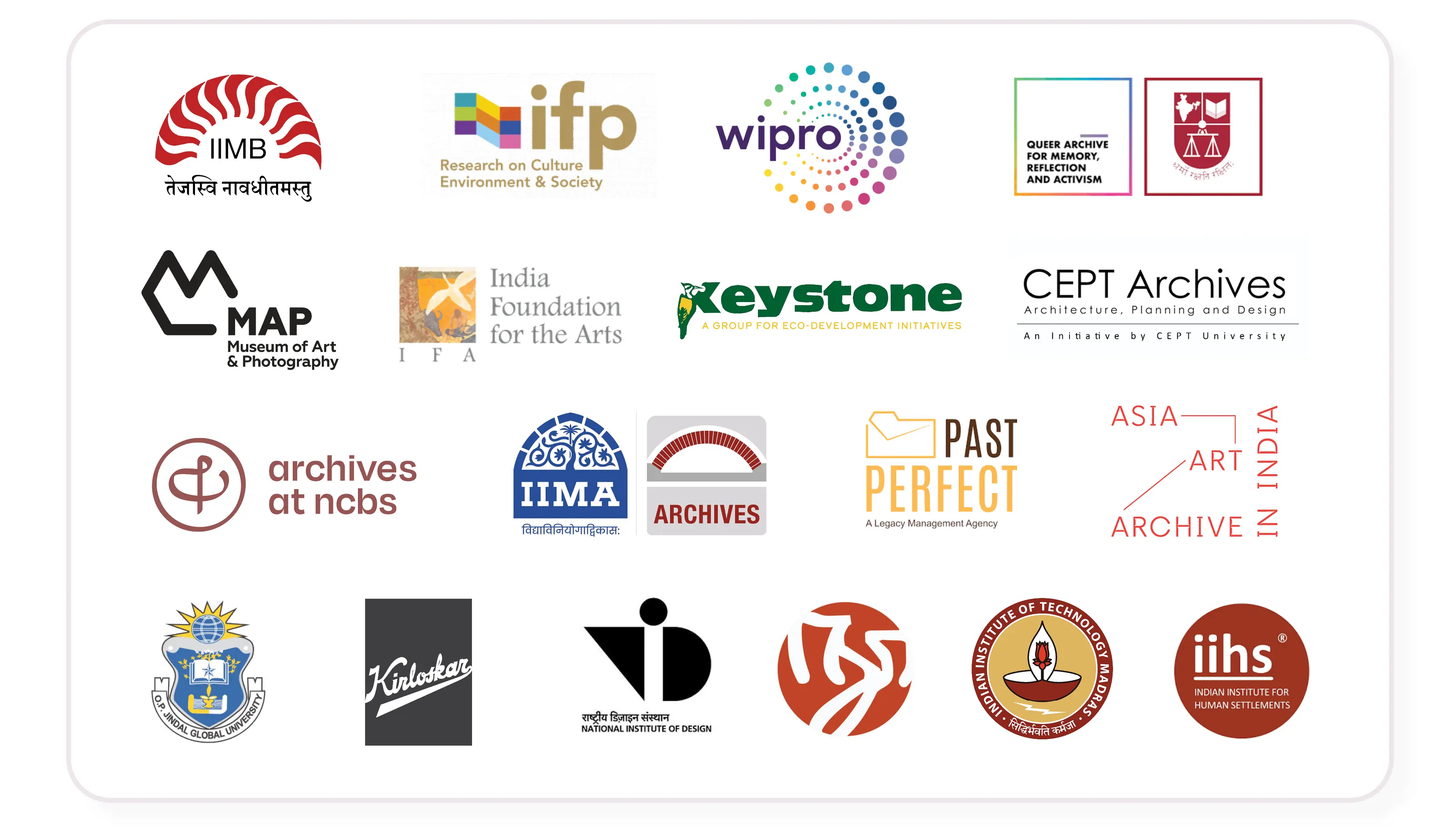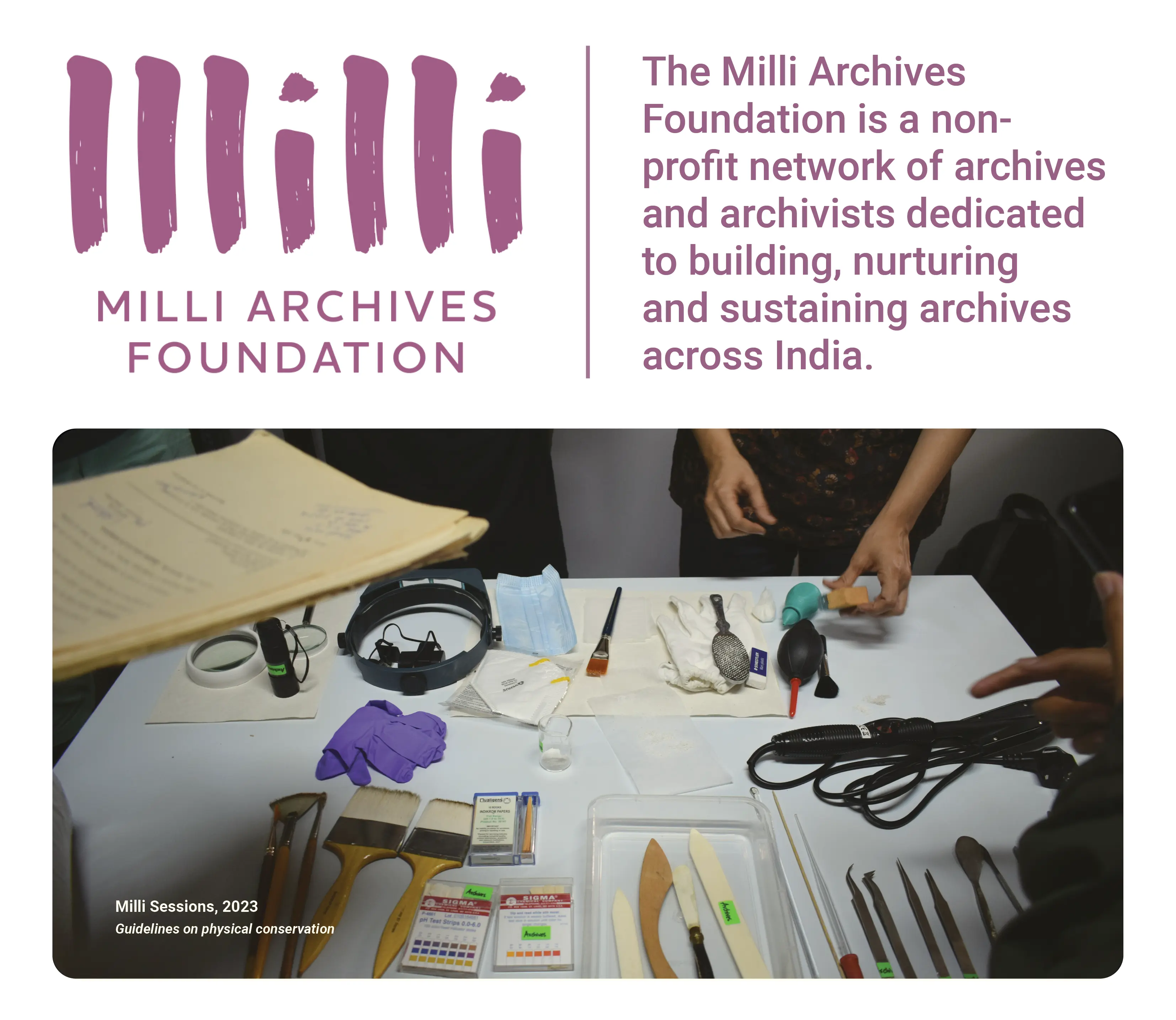Who are we?
The Milli Archives Foundation is a non-profit network of archives and archivists dedicated to building, nurturing and sustaining archives across India. Our registered office is in Bangalore, India. Scroll down for our organization details, address and tax exemption status. Contact us at: hello@milli.link
Wait, what’s an archive?
Archives preserve, describe and make accessible records of enduring historical significance. Such archival records offer valuable insights into the context and process of our lives, ranging from an old family photo album to a bundle of letters between a student and their mentor, from oral histories from community elders to minutes of corporate board meetings, and from comments in a government ministry’s administrative files to cloth banners from social movements. By creating an accessible archive, we can draw from our collective memory and share a diversity of stories for the future.
Why Milli?
India needs a forum for nurturing archives. This includes archival standards, preservation and conservation guidelines, open access teaching manuals, digital tools to allow the public to find and share archival material, and see the archive as part of their daily lives. Milli works with individuals, families, organizations and communities toward building, nurturing and sustaining our collective memory and records in the form of accessible archives. Memory matters, and Milli is here to help.
What does Milli do?
Milli works with individuals, families, organizations and communities toward building, nurturing and sustaining our collective memory and records in the form of accessible archives. It has five areas of work:
- Guidelines and best practices for archives
- Open access tools and resources for archives
- Specialized archival services for tailored needs of archives
- Engaging the public to reimagine archives as part of their everyday lives.
- Training and education in archival methods, from school to professional practice
Milli also facilitates discussions around issues of diversity, archival standards, conservation, physical and digital access, pedagogy, privacy and the development of inclusive description standards. The open access digital platform that Milli is building will allow the public to find, connect, describe and share archival material and stories. It is a unique space not just in India, but anywhere in the world.

Why does this matter?
Archives emerge from our collective stories, and they give rise to future intertwined stories. They should be seen as a vibrant core of the physical and digital commons, a place that citizens instinctively reach out to online, or over a weekend visit with their families. But that just doesn’t happen in India. Archives are very difficult to work with due to lack of visibility, unnecessarily strict regulation, and a great deal of apathy from all sides. We need wider awareness, education and engagement, and a strong push toward structured archives along international standards. Archives need to be examined not just by the fleeting research scholar, but also every member of the public, and also students in secondary or tertiary education, which is perhaps an archives’ biggest untapped potential in India. We want the community to see – and make – connections between their own lives and the disparate archival records flung across repositories. Archives enable diverse stories. This aim guides the work of Milli, the purpose, form and content of an archive, and what environments it could nourish in the future. Through our activities, we intend to foster an environment of archival thinking through education and practice, civic awareness, and broadly, a sense of empathy, seeing a little of us in the other.
What is the origin of Milli, and what has it done so far?
The founding of the Milli Archives Foundation was the result of deliberations within ‘Milli’, a collective of individuals and communities who are passionate about archives. Over the years, the above mentioned ideas have gathered steam through collaborations and the free-to-public Milli Sessions, with over 1500 registrants, over 400 active participants from across India and other countries, and 40+ partnering institutions. There really has been no equivalent to this in the past, and it is a unique initiative even at a global scale. All material from the Sessions is publicly accessible: Milli Sessions.
In January 2023, Milli also launched “Archives, Ethics and the Law in India: A Guidebook for Archivists in India”, in collaboration with the Archives at NCBS. The first draft of this open access guidebook can be reviewed at Archives, Ethics and the Law. The project is perhaps one of the first of its kind in India. It brings together issues relating to archives, law, ethics, ownership, access, and privacy.
As of 2023, due to its wide reach and unique intent in nurturing archives, it is likely there is hardly any significant archival institution in India that is not aware of Milli. Interactions over the Milli Sessions and with participating institutions and individuals gave a clear need for setting up Milli Archives Foundation as a non-profit entity that can scale the ideas and bring about a systemic transformation in how we build and engage with archives in India.
How can I help?
Thank you for considering! Everything Milli does is for nurturing archives in the country. It is a non-profit foundation, and relies on public support to make its work possible. Please do consider supporting this movement, and help build, nurture and sustain our collective memory through accessible archives.
Who is heading Milli?
Milli’s founding directors are Venkat Srinivasan (Head, Archives at NCBS), Maya Dodd (educator and professor at FLAME University), Jayaprabha Ravindran (Retired Assistant Director, National Archives of India). Director’s profiles are outlined at the end of this document.
What is the Milli Member Network?
The member network is a set of archival organizations and archivists who have come together to advise and shape free-to-public archival projects that will benefit all archives in India. Its collective efforts strengthen both individual archives and a network of archives. The network exchanges ideas and shares resources, and their membership supports the basic operations of Milli. All events and project outputs of Milli shall continue to be freely accessible to the public, keeping in line with its intent as a non-profit body that facilitates archival discussion and standards. As of June 2025, the network includes Shubha Chaudhuri (The Archives and Research Center for Ethnomusicology (ARCE), American Institute of Indian Studies), Vrunda Pathare (Godrej Archives) and the following archival organizations: Archive of IIT Madras, Archives at NCBS, Asia Art Archive in India, CEPT Archives, French Institute of Pondicherry, IIM Ahmedabad Archives, IIM Bangalore Library, India Foundation for the Arts Archive, Indian Institute for Human Settlements, Keystone Foundation, OP Jindal Global University, Kirloskar Group Archives, Museum of Art & Photography, NID Archives, Past Perfect, Roja Muthiah Research Library, QAMRA Archival Project at NLSIU, Wipro Archives.

Who has been part of Milli?
Many people! Milli started as an informal tech group around 2017, and a broader archival collective in 2020. Prasoon, Janastu, Ojas Kadu and the Archives at NCBS have brainstormed over some ideas of the digital platform for Milli. The core group that has played a role in shaping archival discussions and the Milli Sessions, which started in 2020, include Aparna Vaidik, Bharat S, Deepika S, Faisal Rehman, Farah Yameen, Jaya Ravindran, Maya Dodd, Priyanka Seshadri, Ranjani Prasad, and Venkat Srinivasan.
Does Milli also have volunteers?
Yes! Volunteers for various Milli Sessions include Anjali JR; Aparna Vaidik; Arnika Ahldag; Athithya; Avarna Ojha; Avehi Menon; Bhanu Prakash; Bharat S; Deepika S; Devi Dang; Dharanee S; Dhatri S; Dibyadyuti Roy; Dinesh TB; Divij Joshi; Divina Ann Philipose; Faisal Rehman; Farah Yameen; Hari Sridhar; Indira Chowdhury; Ishita Shah; Jaya Ravindran; Joel Louzado; Kishor Satpathy; Maya Dodd; Megha Ramachandra; Micah Alex; Ojas Kadu; Padmini Ray Murray; Prasoon; Priyanka Seshadri; Radhika Hegde; Ranjani Prasad; Ravi K Boyapati; Saman Quraishi; Samira A; Samyabrata Roy; Sangeeta D; Sanjna GY; Satakshi Sinha; Shafali Jain; Shalom Gauri; Sharanya Ghosh; Shilpi Dey; Shilpi Goswami; Shreyasi; Shubha Chaudhuri; Shubhojeet Dey; Siddharth Ganesh; Siddhi Bhandari; Sindhu N; Spandana Bhowmik; Srijan Mandal; Tanishka Kachru; Vallabhi Jalan; Venkat Srinivasan; and Vrunda Pathare. As we think of future events, please do email us at hello@milli.link if you’d like to be part of the broader network.
Can I be a part of Milli?
Of course! You can volunteer, collaborate, work on a project with us, or all three! If you are part of an institution/community, organization, family, individual with an archive (or the potential of an archive) that likes the work we have done or have concerns about heritage material and archival records, do send us an email to take things forward: hello@milli.link
Where is this going?
Archives emerge from our collective stories, and they give rise to future intertwined stories. Based on our past work, we are confident that the public will see this critical and indispensable role for archives not just in their life stories, but in education, civic awareness and building community. Milli see five kinds of stakeholders: the archivist and the donor who work together to make these resources visible (including the citizen who simply wishes to create an archive of their family at their own residence), the community member who engages with the archive and sees themselves as part of this interconnected history, the researcher – academic, literary and artistic – who sees new avenues of knowledge production with such a nuanced archival network, the educator who sees new ways of teaching their material by delving into historical context, and most importantly, the student at various levels, who will really take the imagination of the archive forward in whichever field they specialize in the future.
Overview of current directors of Milli Archives Foundation
Venkat Srinivasan heads the Archives at NCBS in Bangalore, a public collecting centre for the history of science in contemporary India. In addition, he currently serves on the institutional review boards for the archives at IIT Madras, ISI Kolkata, and NID Ahmedabad, and on the board of the Commission on Bibliography and Documentation of the IUHPST (International Union of History and Philosophy of Science and Technology). He is a member of the Encoded Archival Descriptions – Technical Sub-committee (Society of American Archivists), and Committee on the Archives of Science and Technology (CAST) of the ICA Section on Research Institutions (International Council on Archives). He graduated with a Masters in Materials Science from Stanford University, a Masters in Journalism (science) from Columbia University, and a Bachelors in Engineering from the University of Delhi.
Dr. Maya Dodd currently serves as the Director of the FLAME Centre for Legislative Education and Research at FLAME University, Pune, India. She received her Ph.D. from Stanford University and subsequent post-doctoral fellowships at Princeton University and JNU, India. She teaches digital cultures in the department of Humanities and has pioneered teaching Digital Humanities (DH) in the liberal arts at the undergraduate level, alongside supervision of doctoral students at FLAME. Through the Ownership of Public History in India grant from the British Academy she has been exploring tools for cultural archiving via techniques from DH. She serves as an editor for the Routledge series on Digital Humanities in Asia. She has also served on the board of the digital humanities association of India, the DHARTI collective.
Jayaprabha Ravindran retired as Assistant Director of Archives, National Archives of India. During a career spanning nearly three decades, she has been closely associated with various core activities of the National Archives of India like acquisition and accession of records (public and private), maintenance of records, facilitating access to the records and library, digital preservation of records and training programme for archives professionals and outreach programmes like seminars/workshops and exhibitions. In addition to heading the major Divisions of the National Archives of India, she has been a resource person in various Workshops on Records Management and archival sources organized by various Government Departments, Ministries, Universities and research centres. She has served as Member, Committee for ‘Study on Archives’, Government of Kerala (2017-19). Currently, she is a Member of the Kannur University Heritage Project, Expert on the Board of Studies, National Museum Institute, for a PG course being developed on Archival Studies; and Consultant, Archival Research, Confluence Media for their publication ‘Birth of a Nation’.
What does Milli mean?
Milli borrows from the Icelandic ‘á milli’ for ‘between’ or ‘in the midst of’ since it speaks to the way we think of the archives being the in-between space between stories, objects and future stories. Milli is also a way, as in Hindi, to have found something. Milli in Latin hints at a way of thinking about a thousand tiny connections. The name, Milli, came up in ~2017-19, during conversations within the initial Milli Tech team, including Prasoon, Janastu and the Archives at NCBS (Bangalore, India), a public centre for the history of science in contemporary India.
What are the organization details?
Milli Archives Foundation is a Section 8 non-profit company (CIN: U91010KA2023NPL172642), with its registered office at Cabin No 32, WS No 6, 102 Eden Park, 20 Vittal Mallya Road, Bangalore - 560 001. Karnataka. India. It has approval for 12A and 80G tax exemptions under the Income Tax Act of India. Contact us at hello@milli.link if you need additional details.


